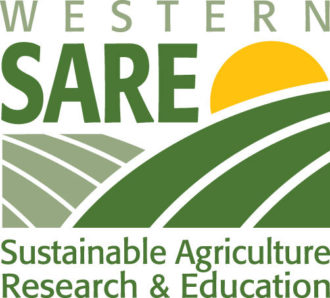Sustainable Agriculture Fact Sheet July 2020
State: California
Commodity: Wine grapes
Need: An economical way to control leafroll virus, which is spread by vine mealybugs
Summary: Leafroll virus is infecting California grapevines at an alarming rate due to an aggressive insect vector, the vine mealybug. Leafroll virus infections reduce crop yield and quality, decrease a vineyard’s lifespan, and make the land less suitable for future grapevine plantings. The Lodi Wine Commission, which has 750 farmers, 100,000 acres of vineyards and a growing problem with leafroll virus, decided it is imperative to demonstrate mealybug biocontrol.
The Research: Led by Dr. Stephanie Bolton, the Research, Education, and Sustainable Winegrowing Director of the Lodi Winegrape Commission, the team created a “Collaborative Beneficial Insect and Pheromone Mating Disruption Demonstration Project” where a group of farmers practiced cooperative, region-wide mealybug biocontrol. Farmers used plant protectants that were safe for beneficial insects, conducted beneficial insect releases, and applied a blanket of protective mating-disruption pheromone across five vineyards.
The team hosted a “Family Field Day” where Lodi’s 750 farmers and their children were invited to learn about collaborative pheromone mating disruption and participate in a drone beneficial insect release. The challenge of mealybugs and virus, along with farmer experiences using biocontrol during this project, were explained in an outreach video and printed fact sheet.
The Impact: Through this project, many farmers learned how to scout for beneficial insects, how to describe the importance of beneficial insects, and interesting facts about the biocontrol process (for example, how the Anagyrus wasp lays an egg inside the vine mealybug’s body) – all making for excellent conversation with potential winegrape buyers, to highlight the farmer’s efforts in sustainability. Additionally, many premium winegrape buyers (those paying a higher price per ton for winegrapes) expect less chemical inputs, which is possible when a farmer employs beneficial insects and pheromone mating disruption.
Not only did farmers learn about beneficial insects through our outreach, they also learned about the financially devastating costs of grapevine viruses. By using an integrated pest management approach to the vine mealybug (which includes biocontrol), the farmer will be able to prolong the use of certain insecticides, better control the vine mealybug, and reduce the economic impact and spread of both leafroll virus and vitiviruses in their vineyard and the neighbor’s vineyards around them.
Pheromone mating disruption is particularly effective in protecting the financial investment of a new vineyard from the vine mealybug populations around it. In our region, the use of pheromone mating disruption before this project was limited to only a few operations. We have seen a large rise in farmers willing to use mating disruption in 2020 as they realize the need to protect their vineyard investments.
More information: stephanie@lodiwine.com, (209) 367-4727
